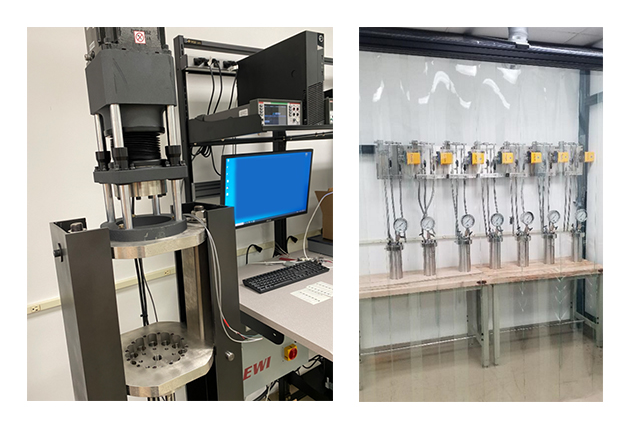
In support of industry-wide investment in carbon neutrality with a key component being a transition to hydrogen as a utility fuel, EWI has developed a unique laboratory capability for testing of material properties under exposure to high-pressure, gaseous H2 environments.
Understanding the influence of hydrogen embrittlement and hydrogen-assisted cracking on the performance of critical infrastructure is essential for safe operation in an H2 energy future. To provide insight into the influence of pressurized hydrogen gas on fracture mechanics properties, EWI’s new H2 environmental testing lab includes a fleet of capable pressure vessels and load frames that allow for a range of tests to be executed under environment. Hydrogen, the smallest molecule known on earth, has a way of evading containment. Therefore, development of test equipment that can safely contain high-pressure hydrogen gas while also actively loading fracture mechanics specimens is not trivial.

EWI has assembled a robust set of equipment specifically designed and dedicated to materials properties evaluation in active hydrogen environments. It should be noted that this is not a combination of pre-soaking or electrochemically charging a specimen with hydrogen, then performing fracture mechanics testing in-air. Rather, testing is performed while the hydrogen environment is contained around the specimen, which allows for direct correlation of the progressive influence of hydrogen on fracture properties.
All the testing to be performed in the hydrogen environmental testing lab is backed by internally developed and verified standard operating procedures. EWI has also committed to investing internal research and development resources to ensure this laboratory is capable of addressing the most complex challenges.
The following is a selection of the tests that can be executed under active gaseous hydrogen:
- Slow Strain Rate Testing – environmentally-assisted tensile properties
- ASME B31.12 – KIEAC/KIH fracture toughness evaluation
- Actively-loaded Fracture Toughness Testing – monotonic load controlled and rising step-loaded regimens
- Fatigue Crack Growth Rate Measurement and S/N Fatigue Evaluation
The first phase of EWI’s hydrogen environmental testing laboratory is fully functional with multiple integrated load frames and static pressure vessels capable of 2000 psi hydrogen (up to 100% pure H2). Expansion is already underway to include dedicated space to operate several more load frames with higher pressure (5000 psi), higher temperature (650 F) pressure vessel.
For more information about specific testing and evaluation capabilities to support your decarbonization efforts, please contact Joshua James at [email protected] or Jon Jennings at [email protected].